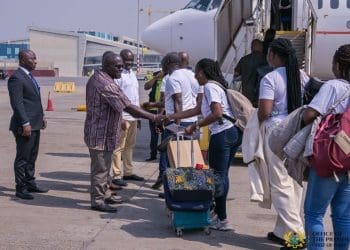A new chapter in medical collaboration between China and Ghana unfolded in Accra on October 31, 2025, when Chinese pharmaceutical giant Dajia Weikang partnered with the Health Community of West Africa (HCOWA) to host a professional training workshop on the integration of Traditional Chinese Medicine (TCM) in women’s health and gynaecology.
The event brought together medical herbalists, doctors, and women’s health advocates to explore how ancient Chinese medical wisdom can support the prevention and treatment of common gynaecological conditions in Africa.
The seminar, themed “The Integration and Application of Traditional Chinese Medicine in Women’s Health and Gynaecology,” was led by Dr. Sandra Ashong, President of the Ghana Association of Medical Herbalists.
Her keynote presentation introduced participants to the foundational concepts of TCM — the balance of Yin and Yang, the harmony of the Five Elements, and the flow of Qi and blood.
Dr. Ashong explained that these holistic principles provide new ways of understanding women’s health challenges such as menstrual irregularities, infertility, menopause, and chronic infections.
“Traditional Chinese Medicine plays a growing role in integrated healthcare,” she said.
“It complements modern medicine, improving treatment outcomes for reproductive and gynaecological conditions.”
A highlight of the event was the discussion of Er Miao Wan, a classical herbal formula produced by Dajia Weikang.
Composed of Atractylodes lancea and Phellodendron, the medicine was praised for its ability to clear heat, remove dampness, and relieve pain in conditions such as pelvic inflammation and leucorrhea.
“Er Miao Wan has shown remarkable effectiveness for women’s health issues linked to damp-heat imbalances,” Dr. Ashong noted. She added that modern scientific research continues to validate the effectiveness of traditional Chinese formulations such as Er Miao Wan.
According to her, studies have shown that the herbal blend not only possesses strong anti-inflammatory and antibacterial properties but also helps regulate hormonal balance in women.
This, she explained, demonstrates how ancient medical wisdom can align with contemporary scientific understanding to provide safe, evidence-based solutions to women’s health challenges.
Another key highlight of the seminar was the introduction of notable TCM herbal products and topical preparations, particularly Baofukang Gel — a pure herbal formulation made from Zedoary Turmeric Oil and Borneolum.
The gel, widely used in managing a range of gynaecological conditions, was presented with detailed explanations of its scientifically proven anti-inflammatory, antibacterial, and mucosal-repairing properties.
Presenters also cited clinical evidence demonstrating its high efficacy in treating vaginitis, cervical erosion, and HPV-related infections.
The practical demonstration segment brought the workshop to life as participants observed and practised acupuncture, moxibustion, and cupping therapy under professional supervision.
“This is my first time experiencing cupping therapy — Traditional Chinese Medicine is truly amazing!” exclaimed a Ghanaian community health worker after the session. Another participant, a local doctor, added, “We really need this kind of knowledge and medicine. It will help us greatly reduce the suffering caused by women’s health issues.”
Beyond the medical lessons, the event represented a major strategic step for Dajia Weikang as it expands its footprint into West Africa.
Through its partnership with HCOWA, the company aims to establish a long-term platform to promote TCM in the region while strengthening medical collaboration between China and Africa.
Lin Qi, Deputy General Manager of Dajia Weikang’s International Business Division, emphasised the company’s commitment to cultural and medical exchange.
“Through professional training like this, we are not only promoting Traditional Chinese Medicine culture but also building a bridge to bring our products and expertise closer to the people of West Africa. We also hope to work with other capable TCM enterprises to explore this promising market together,” she stated.
Speaking on behalf of HCOWA, Vice President Prince Opoku Dogbey lauded the partnership as a model of innovative health collaboration, saying that by connecting traditional and modern medical systems through training and knowledge sharing, their goal is to ensure that West African women benefit from both the wisdom of ancient medicine and the progress of modern science.
As discussions continued at the TCM exhibition area, the workshop ended on a high note, with participants expressing optimism about future collaboration.
For many, the event signalled the beginning of a new era of knowledge exchange — one where the centuries-old practices of Traditional Chinese Medicine can offer modern solutions to women’s health challenges in Africa.
The success of the workshop underscored Dajia Weikang’s broader vision of promoting health, innovation, and partnership beyond China’s borders.
The company’s presence in Ghana marks a tangible step toward deeper China–Africa cooperation in healthcare — a partnership that promises to blend the best of traditional wisdom with the strength of modern science to improve the lives of women across West Africa.














